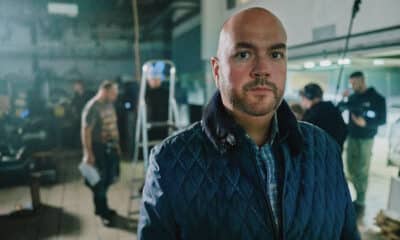
Despite being set in 1971, there’s a pertinence to The Post which allows for this picture to fit into a contemporary political climate – and this compelling narrative couldn’t have been left in safer hands, falling to the venerable Steven Spielberg. Telling the story of The Washington’s Post battle against the government in an unwavering commitment to reporting the truth. Starring Meryl Streep as Katharine Graham and Tom Hanks as Ben Bradlee, Spielberg discusses the speed at which this production came together. Given the strength of the woman at the centre of this tale, Spielberg also comments on the role of women in the film industry, and why he believes The Post to be an optimistic movie.
Many films take many years to come to fruition and others all fall into place rather quickly. Can you tell us which category The Post was in?
Steven Spielberg: There is only one category The Post falls into, which is that it happened instantaneously. A lot of my movies take a long time to develop, I buy books, I do all the scripts, years go by, I make other movies instead. It percolates and comes back into my life and I finally get around to making them. In my entire span of 49 years professionally directing, I’ve never had a film come together this quickly.
Had a certain Presidential election in 2016 gone in a different direction, would there still have been that impetus? Or are the issues bigger than one President?
Steven Spielberg: I think the issues are much bigger than one administration. Had the election gone a different way, I would have still felt a real urge to tell this story. The first thing that attracted me to do The Post was Katharine Graham, her story. Her evolution as a real person of real potential power that did not really have the facility to exercise that power because she hadn’t quite found her centre of gravity, she hadn’t been able to find how to use her own voice. And that is part of her autobiography, that is something that has been written about and talked about, I knew that about Katharine Graham, so before the obvious comparisons between 2017 and 1971, for all of those it was the Katharine Graham story, and eventually her relationship with Ben Bradlee that made a good movie, whether it had been in the last election cycle had that gone differently, or at any time.

The Post
It’s not just a lead role for a woman in the centre – but pivotal roles for women behind the camera. The screenplay is co-written by Liz Hannah, and Amy Pascal is co-producer. How important is it in the film industry that we’re not just about telling about women, but telling stories by women too?
Steven Spielberg: A thing to keep in mind is that there are many more women directors, though not enough of them, who are telling significant stories and making a real place for themselves. The Handmaid’s Tale is one such example. So is the film Mudbound, and Lady Bird. Wonder Woman. There is a new kind of story that is being told. There was a time also where a lot of women ran the green-light system at different studios. Stacey Snider of Universal and now at Fox, and she bankrolled our film. Sherry Lansing, for many years, was the final word at Paramount Pictures. This is not revisionist history, this is just the ebb and flow of women’s involvement at the highest levels. Then there was a dearth of women at the highest levels, in 1971 when the story is told, there were no women CEOs, of any of Fortune 500 companies, until Katharine Graham – she was the first one.
This is a very interesting time – is The Post an optimistic film? And do you personally feel optimistic at the moment?
Steven Spielberg: The Post is a very optimistic motion picture, because the outcome determined the future of the Washington Post. The outcome of this story, of how Ben Bradlee and Katharine Graham, to the genius investigative reporting of Carl Bernstein and Bob Woodward was the money trail that eventually led to Richard Nixon’s resignation. So that’s why the film has that little bit of a visual epilogue, projecting two years into the future, because one did lead to the other, and without the courage of Bradlee and Graham, there would not have been enough cojones, combined with women’s intuition to allow the Washington Post to go after Richard Nixon the way it did. So I really feel we’re able to minimise our story as a prequel to All The President’s Men, because this is what allowed All The President’s Men to become made as a movie.
The Post is available on Blu-ray and DVD 21st May and available to Download from 14th May.

Latest Posts
-


Film News
/ 2 days agoRelease date announced for sci-fi drama ‘Sky Peals’
A UK release has been announced for Sky Peals following a debut on the...
By Paul Heath -


Amazon Prime
/ 2 days agoAmazon’s ‘Red, White & Royal Blue’ with Nicholas Galitzine and Taylor Zakhar Perez is getting a sequel
Ahead of Amazon’s inaugural upfront presentation on May 14, Amazon MGM Studios has confirmed...
By Paul Heath -


Home Entertainment
/ 2 days agoApplauded ‘Snack Shack’ set for home debut in June
Snack Shack has had a home release date set for June in the UK....
By Paul Heath -


Film News
/ 2 days agoRelease date set for brilliant drama ‘The G’ with Dale Dickey
A release date for the brilliant crime drama The G has been set by...
By Paul Heath















